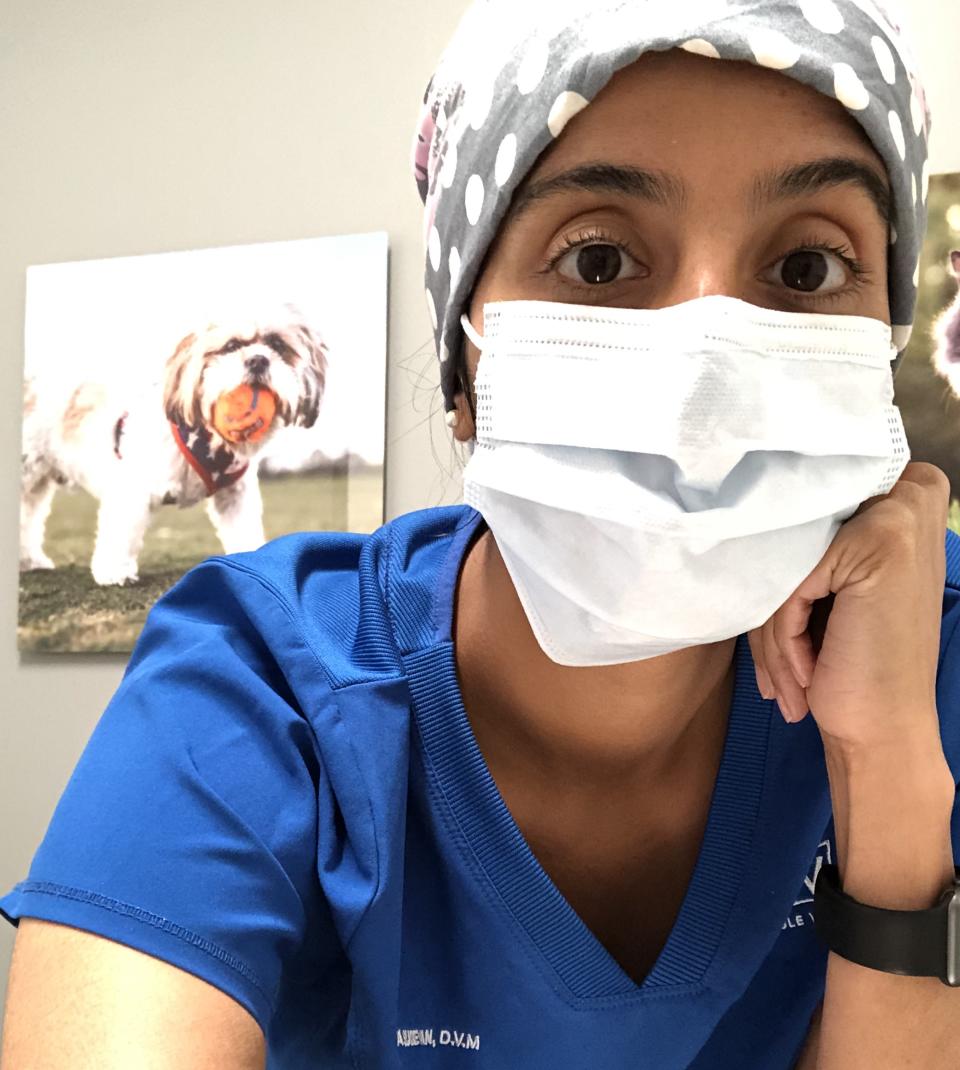Coronavirus takes its toll on essential workers: ‘The highest levels of stress we’ve seen’
Essential workers who have been on the frontline of the coronavirus pandemic are feeling more stress and anxiety now than ever before, according to several crisis hotlines.
“We are seeing conversations with folks who were on the frontline in a lot of different ways: poultry workers, grocery store workers, manufacturing workers — I think it's just the highest levels of stress that we've seen,” says Jaime-Alexis Fowler, founder and executive director of Empower Work, a non-profit organization that provides free mental health services via text to workers across the country, many of whom are working low-wage jobs that are considered essential.
She says the definition of essential workers encompasses between 60 and 75 million working Americans who are overwhelmed by the expectations being placed on them right now, often without a support system. “They're being asked to do something extraordinary and yet they're being asked to do it without the support that would make them feel valued and appreciated as part of that work,” she says.
She gives the example of a poultry worker being asked to show up and work on the line, despite the facility not having adequate safety measures in place, or even a paid sick-leave policy in case the worker contracts the virus. She says workers are also grappling with the decision of showing up and risk getting sick, or staying home to protect their health and the health of their families, without pay.
Crisis Text Line, another nonprofit that provides free peer counseling via texts to those experiencing a mental health crisis, reports that 89 percent of essential workers in the service industry are experiencing stress related to coronavirus, and 41 percent are worried about potentially contracting the virus; further, many worry about bringing it home to their family.
That’s the case for Nita Vasudevan Patel, a small animal general practice veterinarian in Atlanta who is considered an essential worker. While her company has a no-contact policy, she says it’s still been scary.
“How essential is your job, at the end of the day? [I’m] very torn — thankful to have a job, but oftentimes people aren't understanding our fields as being essential and not realizing that we too, as veterinarians, are getting exposed. And making sure that the general public appreciate that and also realizes it is a huge frustration,” she says.

And she worries about bringing coronavirus home to her husband. “We actually had a technician in our hospital last week showing some COVID-19 symptoms, and so we went through quite a scare because she went and thankfully got tested and was negative.”
Fowler says humans simply aren’t set up to deal with the layers of complexity of stress that many essential workers are experiencing during the pandemic. She says there’s an intersection of economic insecurity, health insecurity and mental health issues that creates a combination she calls “truly extraordinary.”
“You are expected to just pull yourself up by your bootstraps … and that's not the way that our brains work. That's not the way that we're set up,” she says.
One of the bright sides for Empower Work is the incredible uptick in those who want to volunteer to become peer counselors and help workers. She says March and April have been record-setting.
Vanessa Baker began extensive training to become a volunteer counselor in the fall and began coaching in January. She says she spends a few hours a week coaching workers from all over the country and that they are largely feeling overwhelmed. “Folks are processing about, ‘what does this mean for my family?’ ‘When is this going to be over?’ ‘Might I get sick out on the street or at work?’” she says. She says she’s also been hearing from workers who have been furloughed, or their hours have been cut. “They don't know if they can successfully find another job in this work environment.”
To date, 33 million Americans have filed for unemployment — the most since Great Depression.
To address the concerns of workers, Baker says she was trained to first listen deeply and acknowledge the emotions and issues presented by the worker. “The Empower Work model is really based on coaching people, which means listening and validating their emotions,” she says. “From there, once the person has expressed themselves and they feel like they can consider the outcome they want to see, then you're helping them identify possible paths to get to that ideal outcome.”
Fowler says volunteers are now prepared to provide tools and resources to those struggling with navigating unemployment benefits, trying to get healthcare or understanding their rights as a worker during the pandemic. “I definitely think our volunteers are on the frontline of emotional support and… are on the frontlines of seeing and connecting with what workers are experiencing.”
For the latest coronavirus news and updates, follow along at https://news.yahoo.com/coronavirus. According to experts, people over 60 and those who are immunocompromised continue to be the most at risk. If you have questions, please reference the CDC’s and WHO’s resource guides.

